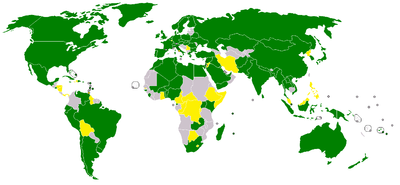- Outer Space Treaty
-
Outer Space Treaty Treaty on Principles Governing the Activities of States in the Exploration and Use of Outer Space, including the Moon and Other Celestial Bodies Signed 27 January 1967 Location London, Moscow and Washington Effective 10 October 1967 Condition 5 ratifications, including the depositary Governments Parties 100[1] Depositary Governments of the United Kingdom of Great Britain and Northern Ireland, the Union of Soviet Socialist Republics and the United States of America Languages Chinese, English, French, Russian and Spanish  Outer Space Treaty of 1967 at Wikisource
Outer Space Treaty of 1967 at WikisourceThe Outer Space Treaty, formally the Treaty on Principles Governing the Activities of States in the Exploration and Use of Outer Space, including the Moon and Other Celestial Bodies, is a treaty that forms the basis of international space law. The treaty was opened for signature in the United States, the United Kingdom, and the Soviet Union on January 27, 1967, and entered into force on October 10, 1967. As of October 2011, 100 countries are states parties to the treaty, while another 26 have signed the treaty but have not completed ratification.[1]
Contents
Key points
The Outer Space Treaty represents the basic legal framework of international space law. Among its principles, it bars States Parties to the Treaty from placing nuclear weapons or any other weapons of mass destruction in orbit of Earth, installing them on the Moon or any other celestial body, or to otherwise station them in outer space. It exclusively limits the use of the Moon and other celestial bodies to peaceful purposes and expressly prohibits their use for testing weapons of any kind, conducting military maneuvers, or establishing military bases, installations, and fortifications (Art.IV). However, the Treaty does not prohibit the placement of conventional weapons in orbit. The treaty also states that the exploration of outer space shall be done to benefit all countries and shall be free for exploration and use by all States.
The treaty explicitly forbids any government from claiming a celestial resource such as the Moon or a planet, since they are the Common heritage of mankind.[2] Art. II of the Treaty states that "outer space, including the Moon and other celestial bodies, is not subject to national appropriation by claim of sovereignty, by means of use or occupation, or by any other means". However, the State that launches a space object retains jurisdiction and control over that object.[3] The State is also liable for damages caused by their space object and must avoid contaminating space and celestial bodies.[4]
Responsibility for activities in space
Article VI of the Outer Space Treaty deals with international responsibility, stating that "the activities of non-governmental entities in outer space, including the Moon and other celestial bodies, shall require authorization and continuing supervision by the appropriate State Party to the Treaty" and that States Parties shall bear international responsibility for national space activities whether carried out by governmental or non-governmental entities.
Following discussions arising from Project West Ford, a consultation clause was inserted in Article IX of the Outer Space Treaty:[when?] "A State Party to the Treaty which has reason to believe that an activity or experiment planned by another State Party in outer space, including the Moon and other celestial bodies, would cause potentially harmful interference with activities in the peaceful exploration and use of outer space, including the Moon and other celestial bodies, may request consultation concerning the activity or experiment."[citation needed]
Follow-ups
- The Moon Treaty of 1979 was meant to be the follow-up to the Outer Space Treaty, but failed to be ratified by any space-faring nation.[citation needed]
- Both the Space Preservation Treaty and the Space Preservation Act of 2001[5][clarification needed] are expansions on the ban of weapons in space, being a ban on all weapons, instead of only nuclear and WMDs, but both so far have had minimal success.[6][7]
See also
International Ownership Treaties Antarctic Treaty System Law of the Sea Outer Space Treaty Moon Treaty International waters Extraterrestrial real estate - High-altitude nuclear explosion (HANE)
- Militarization of space
- Fractional Orbital Bombardment System
- Dennis Hope
References
- J. Hickman and E. Dolman. "Resurrecting the Space Age: A State-Centered Commentary on the Outer Space Regime." Comparative Strategy. vol. 21, no. 1, (2002).
Citations
- ^ a b "Treaty on Principles Governing the Activities of States in the Exploration and Use of Outer Space, includingthe Moon and Other Celestial Bodies". 1/1/08. http://www.oosa.unvienna.org/oosa/SpaceLaw/outerspt.html. Retrieved 2011-10-14.
- ^ Jennifer Frakes, The Common Heritage of Mankind Principle and the Deep Seabed, Outer Space, and Antarctica: Will Developed and Developing Nations Reach a Compromise? Wiscoscin International Law Journal. 2003; 21:409
- ^ "Article VIII - Outer Space Treaty of 1967 - Wikisource". http://en.wikisource.org/wiki/Outer_Space_Treaty_of_1967#Article_VIII.
- ^ "Article VII - Outer Space Treaty of 1967 - Wikisource". http://en.wikisource.org/wiki/Outer_Space_Treaty_of_1967#Article_VII.
- ^ http://www.fas.org/sgp/congress/2001/hr2977.html
- ^ http://www.sourcewatch.org/index.php?title=Space_Preservation_Act
- ^ http://www.govtrack.us/congress/bill.xpd?bill=h107-2977
External links
- International Institute of Space Law
- Full text of the "Treaty on Principles Governing the Activities of States in the Exploration and Use of Outer Space, including the Moon and Other Celestial Bodies" in Arabic, Chinese, English, French, Russian, or Spanish
- "Space Law Probe""
- The Case for Withdrawing From The 1967 Outer Space Treaty
- Still Relevant (and Important) After All These Years: The case for supporting the Outer Space Treaty
- Squadron Leader KK Nair's "Space:The Frontiers of Modern Defence" Knowledge World Publishers, New Delhi, Chap-5 (Examining Space Law...), Pg 84–104, available at [1]
- "Land Sale's over the moon" Sydney Morning Herald, 13 October 2003
Categories:- Arms control treaties
- Cold War treaties
- Treaties of the Soviet Union
- Soviet Union–United States relations
- Treaties of the United States
- Nuclear weapons policy
- Space weapons
- Space law
- 1967 in spaceflight
- 1967 in military history
- Treaties establishing nuclear-weapon-free zones
- Treaties concluded in 1967
- Treaties entered into force in 1967
Wikimedia Foundation. 2010.

